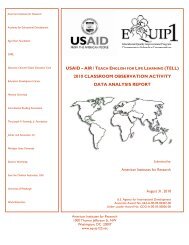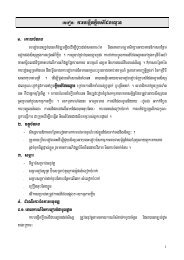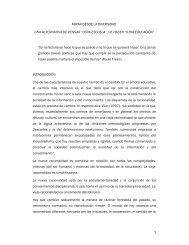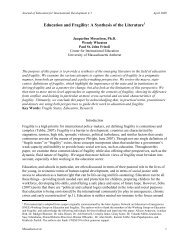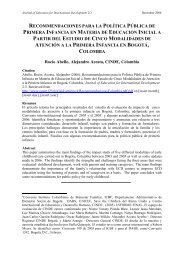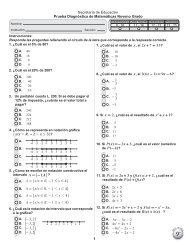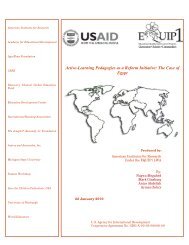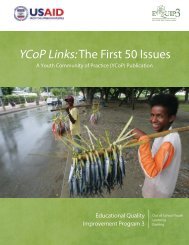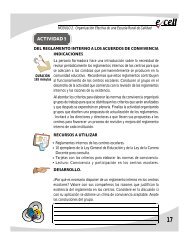The Power of Persistence: Education System ... - EQUIP123.net
The Power of Persistence: Education System ... - EQUIP123.net
The Power of Persistence: Education System ... - EQUIP123.net
Create successful ePaper yourself
Turn your PDF publications into a flip-book with our unique Google optimized e-Paper software.
is not necessarily limited to individual characters, and program interventions<br />
can sometimes enhance other strengths within particular systems. <strong>The</strong> political<br />
leadership that maintained the reforms in El Salvador for 20 years was not<br />
solely due to the individual ministers, but also reflected the group dynamics <strong>of</strong><br />
the civil society leaders involved in the sector assessments and other consensusbuilding<br />
activities. <strong>The</strong> commitment to building national consensus on<br />
education, combined with the active social marketing <strong>of</strong> the reforms, created a<br />
dynamic that was not dependent on the lifetime involvement <strong>of</strong> one individual.<br />
In Nicaragua and Namibia, one observes a bottom-up effort to create<br />
broad-based political acceptance that led to national policy change. While it<br />
was important in both countries that respective school-based management<br />
programs had support from senior leaders, the policy changes were enabled<br />
by the development <strong>of</strong> a critical mass <strong>of</strong> advocates in the regions, districts, and<br />
schools, along with evidence <strong>of</strong> improved outcomes. This was particularly clear<br />
in Nicaragua, where a powerful and charismatic Sandinista MOE entered <strong>of</strong>fice<br />
expecting to terminate the previous regime’s programs. However, because <strong>of</strong> the<br />
advocacy <strong>of</strong> communities, principals and teachers, and supervisors around the<br />
country, the Active School approach not only survived the transition, but also<br />
was adopted as national policy.<br />
<strong>The</strong> process <strong>of</strong> supporting reforms was an important factor in all <strong>of</strong> these<br />
countries. In Namibia, the existence <strong>of</strong> the Steering Committee along with<br />
the close working relationship with USAID, were important factors in<br />
developing trust and the ownership <strong>of</strong> the initiatives. Combined with the highly<br />
participatory pr<strong>of</strong>essional reflection activities in the Northern regions, both<br />
in schools and in the circuits, the reforms gained deep ownership at both the<br />
national and local levels. <strong>The</strong> reforms in El Salvador were influenced not only<br />
by ministry and civil society leaders, but also by a strong and credible source<br />
<strong>of</strong> information and data from EMIS systems and evaluations. <strong>The</strong> reform<br />
agenda in Egypt was strengthened by significant amounts <strong>of</strong> information and<br />
data, and high pr<strong>of</strong>ile events (notably, a high-pr<strong>of</strong>ile technical mission and a<br />
decentralization conference) that engaged the education sector and mobilized<br />
support. Also important were development <strong>of</strong> capacity, and commitment <strong>of</strong><br />
sub-national ministry personnel and other stakeholders.<br />
5. Contextual forces outside <strong>of</strong> the national education sector can impact the<br />
potential for reform, creating opportunities for and constraints on change.<br />
<strong>The</strong> driving forces for system change may be external or domestic, but can<br />
be critical to enabling change. One <strong>of</strong> the core elements <strong>of</strong> system reform<br />
is the idea <strong>of</strong> ‘creating space’ in the system; that is, finding opportunities to<br />
140<br />
SECTION 3: SUMMARY fINdINGS ANd CONClUSIONS



